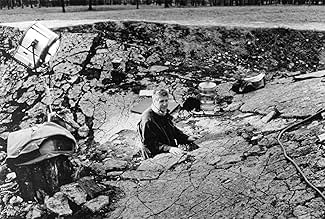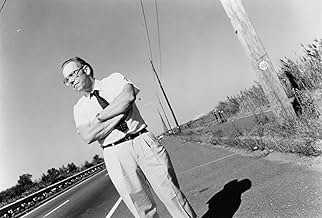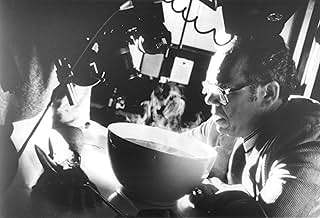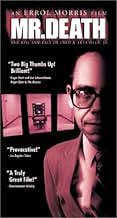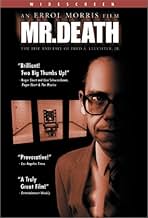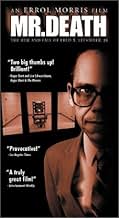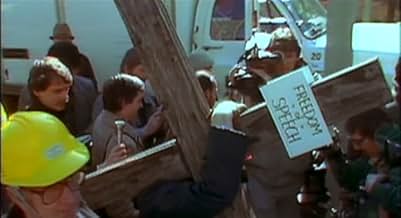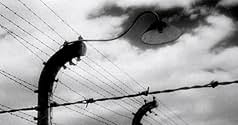AVALIAÇÃO DA IMDb
7,5/10
5,9 mil
SUA AVALIAÇÃO
Adicionar um enredo no seu idiomaA cinematic portrait of the life and career of the infamous American execution device designer and holocaust denier.A cinematic portrait of the life and career of the infamous American execution device designer and holocaust denier.A cinematic portrait of the life and career of the infamous American execution device designer and holocaust denier.
- Prêmios
- 1 vitória e 8 indicações no total
Fred A. Leuchter Jr.
- Self
- (as Fred Leuchter)
Caroline Leuchter
- Self
- (narração)
Adolf Hitler
- Self - Leaves Plane
- (cenas de arquivo)
- (não creditado)
Errol Morris
- Self - Interviewer
- (narração)
- (não creditado)
Avaliações em destaque
This is the story about how the world's foremost authority on gas chambers and all methods of executions proved that the Nazi "gas chambers" could have never operated the way historians claim. It completely destroyed his life, proving that Jews control the world. I assume Errol Morris wasn't intending on letting his feelings be known but it seems like he tries hard to make Leuchter look like a bad man and he consistently fails. It's really strange that he would make dramatic recreations of stuff that happened. That has no place in a documentary. The most interesting thing about the movie is that everyone who tries to discredit or insult Leuchter has absolutely no facts or real argument. They can only say things like he "desecrated a holy land" or "wasn't qualified". After the Jewish man who did the tests on the concrete samples and then testified that his results and report were 100% accurate and true, found out what the trial was about, he quickly says that he performed the wrong tests. The only argument anyone can muster is "you have to be crazy to say this". They claim Leuchter just wanted the spotlight but it's very clear that's not true. He was dragged into a court case and provided expert testimony, without bias. The only accurate statement his detractors made is that he came from nowhere and returned to nowhere. It's not only true, it's all he wanted and it doesn't even matter. This movie proves he is right.
Errol Morris has certainly 'injected' (pardon my contextural
pun) a bit of energy into the documentary form, even if the
films he makes lie somewhere outside its confines. Mr Death,
with its characteristic visual flourishes and tangents, is no
exception to this, though it does contain excerpts of a 'true'
documentary of Leuchter pilfering 'evidence' from Auschwitz.
Morris' film refutes Leuchter's findings to the point that the
only viewer who would give tham any credence would have to be as
biased as Ernst Zündel, the revisionist publisher whom
Leuchter's testimony defended. One detail of the film sticks out
in my mind... the home movies of young Leuchter accompanying his
father to work at the local prison, where he pals around with
the convicts, and explains how he learned at this tender age to
pick locks, pockets and safes... and with audible smugness
relates that these skills have actually aided him later in life.
The image of this boy nebbish, undoubtedly an outcast and loner
at school and socially, gaining acceptance amongst the convicts
helps to explain why such an intelligent and resourceful person
could be duped by the likes of the pinheaded, hateful Neo-Nazi
Revisionists. Here's a group of 'bad guys' accepting, applauding, listening and agreeing to Leuchter. Of course this
is because his undeniably faulted research supports their own
misguided conclusions. But it mirrors his experiences as a boy
among the convicts and provides a strong psychological
foundation for Leuchter's downfall into his delusional world. I'd recommend this film to anyone who enjoys thought-provoking
cinema, realizing that they are sadly in a minority amongst
filmgoers.
pun) a bit of energy into the documentary form, even if the
films he makes lie somewhere outside its confines. Mr Death,
with its characteristic visual flourishes and tangents, is no
exception to this, though it does contain excerpts of a 'true'
documentary of Leuchter pilfering 'evidence' from Auschwitz.
Morris' film refutes Leuchter's findings to the point that the
only viewer who would give tham any credence would have to be as
biased as Ernst Zündel, the revisionist publisher whom
Leuchter's testimony defended. One detail of the film sticks out
in my mind... the home movies of young Leuchter accompanying his
father to work at the local prison, where he pals around with
the convicts, and explains how he learned at this tender age to
pick locks, pockets and safes... and with audible smugness
relates that these skills have actually aided him later in life.
The image of this boy nebbish, undoubtedly an outcast and loner
at school and socially, gaining acceptance amongst the convicts
helps to explain why such an intelligent and resourceful person
could be duped by the likes of the pinheaded, hateful Neo-Nazi
Revisionists. Here's a group of 'bad guys' accepting, applauding, listening and agreeing to Leuchter. Of course this
is because his undeniably faulted research supports their own
misguided conclusions. But it mirrors his experiences as a boy
among the convicts and provides a strong psychological
foundation for Leuchter's downfall into his delusional world. I'd recommend this film to anyone who enjoys thought-provoking
cinema, realizing that they are sadly in a minority amongst
filmgoers.
In Errol Morris's film, "Mr. Death", Fred Leuchter Jr. comes across as a passionless, mechanical robot, fitting the engineering profession that he devoted his life to. Leuchter, the innovator of many death penalty devices and subsequently the only scientist willing to testify favorably in a celebrated Canadian trial that questioned the existence of the Holocaust, is either a hero to some or a villain to many. Morris, except for a Frankenstein-inspired opening and closing set in the film, prefers to let Leuchter be Leuchter rather than adding more contempt to a decidedly pitiful figure. The one time Morris does appear to interfere is when he asked Leuchter point blank if he could have been mistaken in any of his analysis. There are also camera tricks which render what Leuchter did as malicious, such as the split screen between what was Auschwitz and now, the slow-motion as Leuchter is chipping away at sites many Jews consider holy ground, and the phasing in and out of color and black and white film as we see Leuchter demonstrate his electric chair. The motivation behind what he did lies at the heart of "Mr. Death". He aspired to perfect the most humane killing machine because he said he believed in capital punishment, not capital torture. He cared that prison guards who knew the death-row inmates well would not have to suffer cleaning up the morbid residuals of those electrocuted. Yet he tried to carry this same mind-set in understanding the gas chambers at Auschwitz. In his mechanical mind, he asked how he could have done a better job of extermination. "Mr. Death" is an unpleasant but needed lesson about the mosaic people who live and work with each of us everyday - a people who seem anti-social yet amoral and who seem to be guided by that inner light that we can barely know or understand.
MR DEATH is one of my favourite types of documentary: those that tell a story you're completely unfamiliar with, but which turn out to be extremely compelling and indeed gripping thanks to the stuff being presented. In many ways, this is a simple story of one man's fame and later infamy, although director Morris uses it as a springboard to embrace some wider concepts, such as capital punishment and the Holocaust.
One of the important things that I took away from this was that Leuchter is no villain: just a misguided man who didn't necessarily deserve all the hatred aimed at him. Yes, he made a grievous mistake, but to destroy his life as a result of that error? "Let he who is without sin...", etc. The political side of the documentary is especially interesting as a result.
One of the important things that I took away from this was that Leuchter is no villain: just a misguided man who didn't necessarily deserve all the hatred aimed at him. Yes, he made a grievous mistake, but to destroy his life as a result of that error? "Let he who is without sin...", etc. The political side of the documentary is especially interesting as a result.
Leuchter is one amazing guy. This is a guy who became one of the US's foremost experts on death engineering - he designed and built/rebuilt several execution devices for death rows throughout the nation. Then, tragically, he took it upon himself to travel to Auschwitz and hammer bits off the gas chambers to bring home for cyanide testing. His conclusion: no-one was gassed there. Oops. Then he compounded his mistake by testifying for Ernst Zundel and speaking at holocaust-revisionist meets throughout the world.
So, an excellent subject for a movie, and Morris does an okay job. There are a few faults. The quality of some of the interview footage is quite poor. And there is the question of the reconstructions. Leuchter provided Morris with plenty of "home movies" which are incorporated into the film, so the function of the reconstructions seems merely to be to reinforce in our minds the dramatic qualities of a lot of the actions Leuchter performed. Personally, I could've done without them.
10/10 for the subject, 6/10 for the film-making, gives 8/10 overall.
So, an excellent subject for a movie, and Morris does an okay job. There are a few faults. The quality of some of the interview footage is quite poor. And there is the question of the reconstructions. Leuchter provided Morris with plenty of "home movies" which are incorporated into the film, so the function of the reconstructions seems merely to be to reinforce in our minds the dramatic qualities of a lot of the actions Leuchter performed. Personally, I could've done without them.
10/10 for the subject, 6/10 for the film-making, gives 8/10 overall.
Você sabia?
- CuriosidadesAccording to A Brief History of Errol Morris (2000), Morris made a rough cut that he showed to colleagues and friends that only had Leuchter interviewed and it was Morris' intention that the audience would understand he was saying things either as lies or flat-out wrong. He was advised to go to Auschwitz and dig deeper so that there would be no doubt for the audience that Leuchter was wrong.
- Citações
Fred A. Leuchter Jr.: The human body is not easy to destroy and it's not easy to take a life humanely and painlessly without doing a great deal of damage to the individual's body.
Principais escolhas
Faça login para avaliar e ver a lista de recomendações personalizadas
- How long is Mr. Death: The Rise and Fall of Fred A. Leuchter, Jr.?Fornecido pela Alexa
Detalhes
- Data de lançamento
- Países de origem
- Idioma
- Também conhecido como
- Mr. Death: The Rise and Fall of Fred A. Leuchter, Jr.
- Locações de filme
- Empresas de produção
- Consulte mais créditos da empresa na IMDbPro
Bilheteria
- Faturamento bruto nos EUA e Canadá
- US$ 507.941
- Fim de semana de estreia nos EUA e Canadá
- US$ 24.125
- 2 de jan. de 2000
- Faturamento bruto mundial
- US$ 507.941
- Tempo de duração1 hora 31 minutos
- Cor
- Mixagem de som
- Proporção
- 1.85 : 1
Contribua para esta página
Sugerir uma alteração ou adicionar conteúdo ausente

